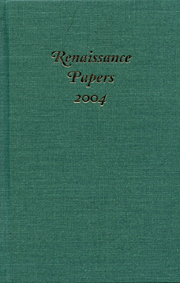Book contents
- Frontmatter
- Contents
- Renaissance Papers
- All Ovids Elegies, the Amores, and the Allusive Close of Marlowe's Hero and Leander
- Revisiting Shakespeare's Eliot
- “'Tis Rigor and Not Law”: Trials of Women as Trials of Patriarchy in The Winter's Tale
- Crossing Wits: Donne, Herbert, and Sacramental Rhetoric
- Love and Power: The Rhetorical Motives of John Donne's 1622 Sermon to the Virginia Company
- Crashaw, Catholicism, and Englishness: Defining Religious Identity
- Addendum
- Beyond “no end”: The Shape of Paradise Lost X
Love and Power: The Rhetorical Motives of John Donne's 1622 Sermon to the Virginia Company
Published online by Cambridge University Press: 12 September 2012
- Frontmatter
- Contents
- Renaissance Papers
- All Ovids Elegies, the Amores, and the Allusive Close of Marlowe's Hero and Leander
- Revisiting Shakespeare's Eliot
- “'Tis Rigor and Not Law”: Trials of Women as Trials of Patriarchy in The Winter's Tale
- Crossing Wits: Donne, Herbert, and Sacramental Rhetoric
- Love and Power: The Rhetorical Motives of John Donne's 1622 Sermon to the Virginia Company
- Crashaw, Catholicism, and Englishness: Defining Religious Identity
- Addendum
- Beyond “no end”: The Shape of Paradise Lost X
Summary
A public statement of John Donne's views on the colonial project, his sermon preached to the Honorable Company of the Virginian Plantation on 13 November 1622 examines the motives inspiring the explorations of the Virginia Company, and demonstrates Donne's own rhetorical management of the tensions that imbued that homiletic occasion. The sermon relies for its effects on what Carrithers and Hardy call “the fact of dialogue” with the new world, a theatre or arena to which both preachers and company men had been called as ambassadors of Christ focused on conversion of native Virginians into Christians rather than the conversion of crops into gold. It is this dialogue that invests the Virginia Company sermon with both its energy and its resolve.
While Donne's message to the Virginia company is situated in a precise pulpit moment, it also needs to be understood more generally in relation to his politics and his pastoral theology, which “tended to look beyond vicissitude, especially beyond the transient manifestations of political power,” toward God. The public sphere these sermons appear to reject (as when Donne says “we always avoid … publick things”) is nonetheless invoked by Donne's consistently analogical habits of thought that “construed a politics far more for the civitas Dei of love than merely for ephemeral power contests in the civitas terrena.” As an index of Donne's increasing visibility in the pulpit, the sermon attests to his “professional” fitness for the task of mediator and interpreter of official ecclesiastical and political policy in the public sphere of the pulpit.
- Type
- Chapter
- Information
- Renaissance Papers 2004 , pp. 85 - 106Publisher: Boydell & BrewerPrint publication year: 2005



